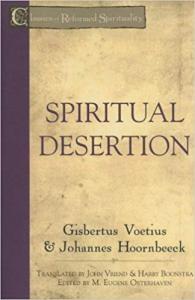We all feel down at times. Low blood sugar, tragedy, and everything in between can bring on depression. The translation of Spiritual Desertion by Gisbertus Voetius and Johannes Hoornbeeck is not targeted at any of these kinds of ailments. Instead, they are responding to the uniquely Christian feeling of the collapse of assurance and sense of having been abandoned–deserted–by God. This is really two books, with the first having been started by Voetius, then re-started and completed by Hoornbeeck. There is also an excellent introduction that sorts this out and puts both writers in their context.
So what is “spiritual desertion”?
We describe spiritual desertion as follows: It is an inner cross or spiritual sorrow and trial as a result of which a person, now being truly converted to God, fails to feel his or her heart’s delight in God and divine things. It results from the darkening of one’s assurance and clarity with respect to appropriation by a personal faith.” (pg 30)
In other words, it is exactly what it sounds like–the sense that God has abandoned us. This is not a doubt about the nature of the faith, or a failure to believe that Scripture is true, or any of the other topics that apologetics is designed to grapple with. Instead, it is the sense that these things are not true for me. Yes, Christ died for the sins of all who repent and believe, and there are people who have been redeemed and are going to heaven, but I do not feel as if these promises are true for me.
“The true subjects of [spiritual] desertion, the people in whose life it is found, are only believers, for this is their peculiar and incommunicable kind of suffering and illness, just as eclipses only occur in the case of the sun and the moon. Unbelievers and hypocrites are only ‘wandering stars’ (Jude 13), not those two great lights. Hence in them that which was never there cannot be eclipsed and lacking.” (pg 31-32)

This is a problem for Christians alone, and one that seems to be largely unique to us.
There are, according to Voetius, specific reasons why God subjects believers to this situation:
“The immediate ends for which God sends desertion, or abandonment, are:
-that the believer may be tested and so become better known to himself and others;
-that the desire for grace and glory may increasingly be strengthened in him;
-that hidden sins may be uncovered and future sins prevented;
-that he be taught tenderness of conscience and a correct and precise observation of his conduct;
-that he become empty and poor of spirit;
-that he obtain an aversion to this world and to the pilgrim’s life;
-that he be weaned of external, earthly joy and consolation;
-that he learn to be fed with tears as the only delicacy of consolation when the Comforter is not present;
-that on account of these things he may cling to his God all the more firmly.” (pg 40)
And just as spiritual desertion is not without reason, so it is not without cure (though the cure is never promised, and may only come late in life). Fortunately, there is no mystery when it comes to curing spiritual desertion. It is the same cure that applies to all of mankind’s greatest needs: the application of the Gospel to the soul. As with salvation, in cases of spiritual desertion this will happen in God’s time, rather than in ours. Yet, there are some things we can do and things we should keep in mind when we are deserted ourselves, or (especially) when we are helping others who are feeling deserted.
Dr. Coyle Neal is co-host of the City of Man Podcast and an Associate Professor of Political Science at Southwest Baptist University in Bolivar, MO












